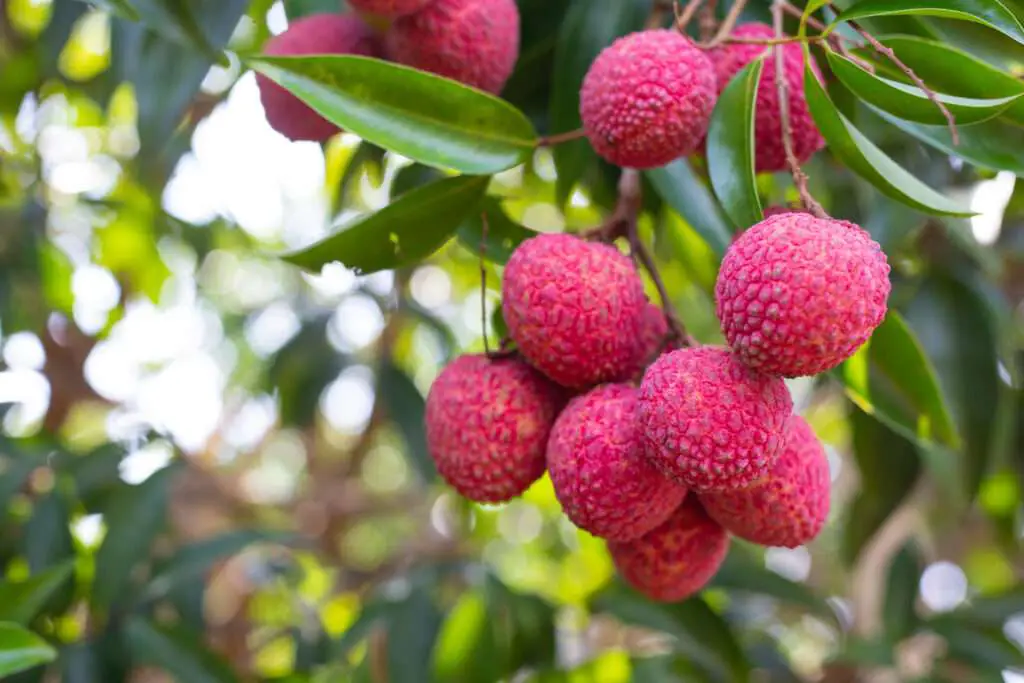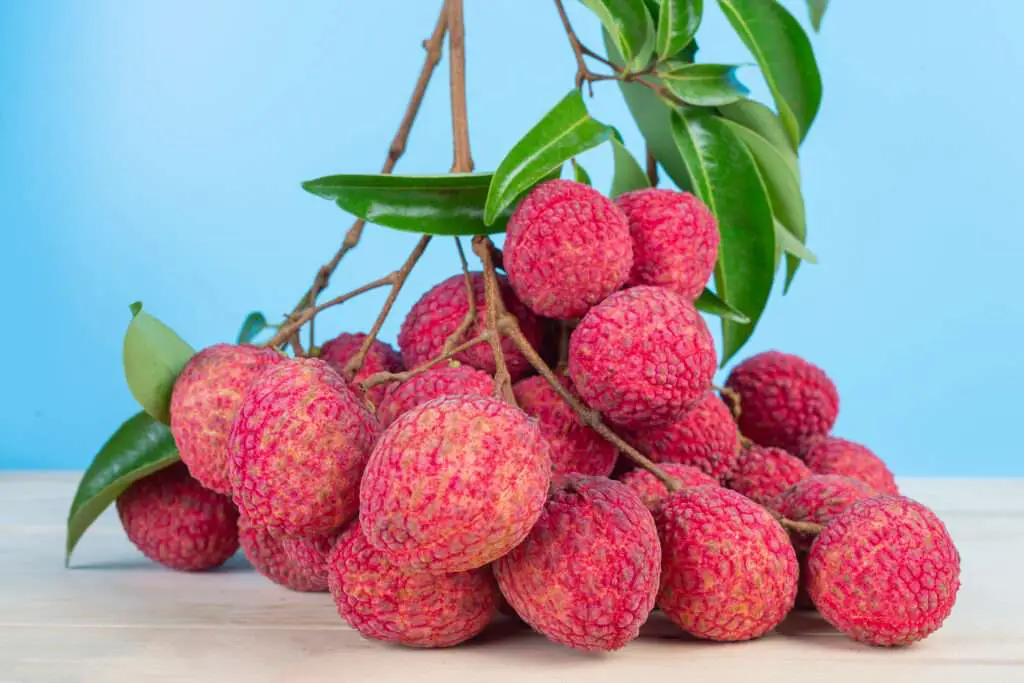Introduction

image credit: Freepik
Cats are obligate carnivores, meaning that all they need for good health and happiness is animal protein. It does not follow that cats shouldn’t eat certain plant material just because it is safe to eat. Eating some plants by cats is not a problem. Some plants even have nutritional benefits that cats may be able to receive.
Can cats eat lychee? The short answer is that since lychee is not poisonous, cats can consume it provided they have removed the skin and seed.
There are a few things to consider before you decide to give your cats lychees.
Table of Contents
Can cats eat lychee? Step by step
Here are some steps we need to take.
Step 1:
The first thing to keep in mind is that cats generally eat meat, so they don’t often eat sweet things like lychee. Diabetes and weight gain can be caused by too much sugar.
Step 2:
Check out the parts of the lychee. Cats might have digestive problems due to the tough skin. There is also a big seed inside that can cause stomach problems or choking hazards.
Step 3:
It is also important to check if there are any chemicals on the lychee, such as pesticides. These aren’t suitable for cats. Make sure lychee is super clean before giving it to your cat.
Not that it is an emergency, but a tiny piece of fresh, peeled, seedless lychee is not the best cat snack either. Like too much sugar and hard parts, there are more risks than benefits.
Maintaining your cat’s health and happiness as a pet owner will be made easier by feeding it ethically.
Interesting Topics:
- can cats kill each other
- wh does mom cat bite her kittens
- why does my cat keep following me after giving birth
How Do I Give My Cat Lychee?
This is a basic how-to. Peel the lychee first, as the skin can be rough on your cat’s stomach. Select ones without seeds to prevent choking issues.
However, keep in mind that lychee contains a high sugar content that may not be suitable for cats.
Wash the lychee thoroughly before the big event to remove any unwanted substances, such as pesticides. Break it up into small pieces so your cat can easily consume it.
When introducing lychee to your cat, keep an eye on them; if they don’t seem interested or like it, that’s okay too. Cats are tasteful creatures!
However, remember that lychee shouldn’t replace your cat’s typical diet. It’s more like a small snack. Additionally, be sure to see your veterinarian before giving your cat any new treats.
Going slow and paying attention will help you keep your cat happy and healthy while giving them a small amount of lychee.
How Often Can I Give My Cat Lychee?

image credit: Freepik
Do you know how much lychee is safe for your feline friend? Keep it short: not too frequently. Lychee is more of a special treat for cats, who primarily require meat. However, because lychee contains a high sugar content, consuming too much of it can be problematic.
A reasonable weekly limit for a small snack would be once. Keep an eye on your cat’s reactions. It’s okay to forego the lychee the next time if they don’t seem into it or behave strangely afterwards.
See your vet before administering lychee. What’s safe for your cat will be disclosed to you. Recall that lychee shouldn’t be used in place of their regular meals; it should only be a treat occasionally.
If you strike the correct balance, you can keep your cat happy and healthy.
Is lychee safe for your cats? Still Thinking
No, it’s not. Cats mostly eat meat, and lychee has things that can be bad for them. Like, it has a lot of sugar that can make cats gain too much weight and maybe get diabetes. Also, the tough skin and big seed in lychee can be hard for a cat’s tummy.
And there’s another problem – lychee might have yucky stuff on it, like pesticides. Even a little bit of this can make a cat sick. So, it’s better not to share lychee with your cat.
If you think your cat ate lychee or something bad, go see the vet right away. Vets know how to help. Remember, it’s best to stick to food that’s good for cats, like their regular meals.
Why Do my Cat Love Lychee?
Ever wonder why your cat might be curious about lychee? Well, it could be because of the sweet smell and juicy feel of the fruit. Cats are naturally curious, so when they catch a whiff of something new, they might want to check it out.
But, here’s the thing – even though your cat might be curious, it’s not a green light to give them lychee. Lychee has lots of sugar, which isn’t good for cats. Plus, the tough skin and big seed inside can be tricky for their little tummies.
It’s vital to keep your cat safe and healthy. Give them cat-approved treats instead of sharing lychee. Not only are these treats delicious, but they’re also safe for your pet.
It’s best to divert your cat with something specifically designed for them if you ever notice that they are becoming overly fascinated in your lychee.
Recall that cats have unique dietary requirements. So, you can maintain your feline friend’s happiness and health by doing what’s best for them.

How Can Lychees Benefit Cats?
Cats really don’t benefit much from lychees. Since lychees may contain unwholesome ingredients, cats require meat. For example, the high sugar content of lychees can lead to weight gain and illness in cats.
Moreover, lychees’ large seeds and tough skin can be difficult for a cat’s stomach to handle.
Giving lychees is not as good as sticking to cat food designed specifically for them. Safe and delicious cat treats. Giving cats the proper food is crucial to keeping them happy and healthy because their needs differ from those of humans. See the veterinarian before making any dietary changes for your cat. They can assist you in making the best decision for your pet.
Preparing Lychee for Your Cat Step By Step
The secret to preparing lychee for your cat is to proceed with caution. Although lychee is not a perfect fit for a cat’s natural diet—they are obligate carnivores—a small, infrequent indulgence can be tolerated with some care.
Make sure the lychee is fresh and ripe first and foremost. To avoid any choking hazards, choose seedless lychee and remove the tough outer skin, as it could be difficult for your cat’s digestive tract to process.
Give your cat a thorough wash before giving it lychee to avoid any possible pesticide or dangerous chemical residues that might be on the surface. To make your lychee easier for your cat to handle, chop it into small, bite-sized pieces after cleaning and prepping.
As you introduce lychee to your cat, pay careful attention to how they respond. Respecting your cat’s preferences and not forcing the fruit upon them are important if they show signs of discomfort or disinterest.
It’s important to practice moderation; making lychee a treat rather than a staple of their diet helps avoid any potential health problems brought on by the fruit’s high sugar content.
Don’t forget to speak with your veterinarian before giving your cat new foods. Although some cats may be interested in lychee, tolerances and personal preferences can differ.
You can give your cat a tiny taste of lychee by following these careful instructions, which will guarantee a pleasurable experience while putting their general health first.
Conclusion
Can cats consume lychee, then? No, better that they not. Lychee contains components that may be difficult for them to digest and high sugar content, both of which are potential health risks. Consult your veterinarian if you’re ever unclear about acceptable treats for your feline. They can assist you in selecting the proper snacks to maintain your cat’s health and happiness. Recall that it’s safer to say no when it comes to lychee and your feline companion.
FAQs: Can Cats Eat Lychee?
1. Can I give lychee to cats?
Yes, you can give, because cats can safely eat lychees in controlled amounts. However, there are a few important considerations to keep in mind:
- Remove the seeds.
- Moderation:
- Hydration and Fiber:
- Nutrients:
2. What are the benefits of eating lychee for cats?
Cats can eat lychee fruit without worrying about any serious side effects. While cats cannot taste sweet, some may enjoy lychees due to their texture and water content. Here are the benefits that cats could gain from lychees:
- Hydration:
- Digestive Support:
- Nutrients:
3. Are Lychees Toxic for Cats?
No lychees are not toxic for cats to eat in moderation. Although cats cannot taste sweet, they can eat a little bit of lychee without harm. However, there are important considerations:
- Skin Removal:
- Seeds:
- Moderation:
4. What fruits are toxic to cats?
Cats, while primarily carnivores, may occasionally enjoy some fruits as treats. However, it’s difficult to be aware of which fruits are safe and which can be harmful for cats. Here are some points:
Safe Fruits for Cats:
- Blueberries:
- Cranberries:
- Bananas:
- Watermelons:
- Cantaloupes:
Fruits to Avoid or Limit:
- Grapes and Raisins:
- Cherries, Plums, and Peaches:
- Avocado:
- Apples and Pears:
Remember to consult your veterinarian before introducing any new foods to your cat’s diet.


